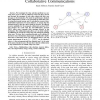Free Online Productivity Tools
i2Speak
i2Symbol
i2OCR
iTex2Img
iWeb2Print
iWeb2Shot
i2Type
iPdf2Split
iPdf2Merge
i2Bopomofo
i2Arabic
i2Style
i2Image
i2PDF
iLatex2Rtf
Sci2ools
107
click to vote
CORR
2008
Springer
2008
Springer
Resource Allocation and Relay Selection for Collaborative Communications
Abstract--We investigate the relay selection problem in a network where users are able to collaborate with each other; decode and forward the messages of each other along with their own messages to the destination. We study the performance obtained from collaboration in terms of 1) increasing the achievable rate, 2) saving the transmit energy, and 3) reducing the resource (timebandwidth) requirement. To ensure fairness, we assume that the transmit energy to the rate ratio is fixed for all users. We allocate resource optimally for the proposed collaborative protocol (CP) and compare the result with the non-collaborative protocol (NCP) where users transmits their messages directly to the destination. The collaboration gain allows us 1) to decide whether to collaborate or not and 2) to select one relay among the possible relay users. We show that a considerable gain can be obtained if the direct source-destination channel gain is significantly smaller than those of alternative links. We d...
Related Content
| Added | 10 Dec 2010 |
| Updated | 10 Dec 2010 |
| Type | Journal |
| Year | 2008 |
| Where | CORR |
| Authors | Saeed Akhavan-Astaneh, Saeed Gazor |
Comments (0)

